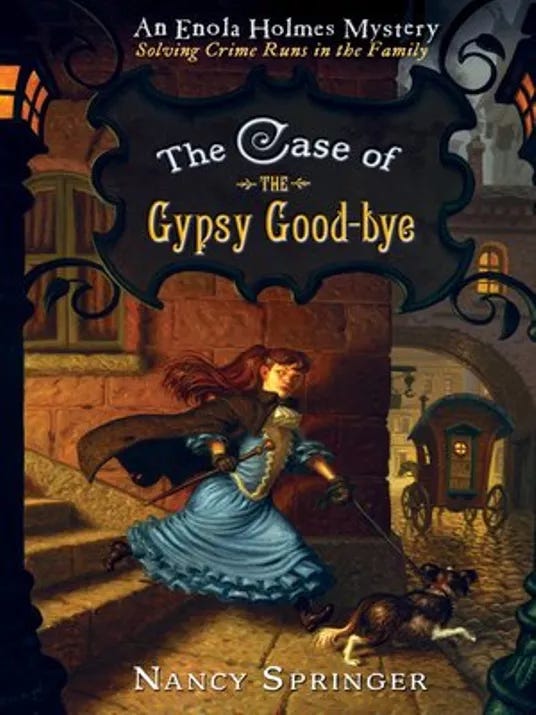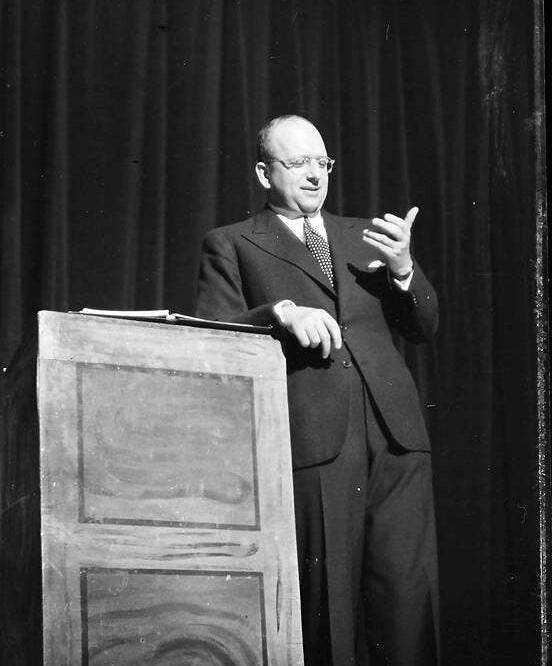The Power of the Clown
How a "fairy-tale figure" defied the Nazis with gentle wit.
His character was at bottom harmless and amiable, his wit gentle, light, and capricious…This harmless amiability hid a kernel of real, indomitable courage.
—Sebastian Haffner on Werner Finck 1
What do Enola Holmes and a 1930s German comedian have in common? In short, a fortifying mixture of wit and courage. These characters, one fictional and one historical, seem to have intersected in my head at just the right time.


I can’t fall asleep without reading, but now more than ever, the bedtime book needs to be light. Last night, one of Nancy Springer’s YA Enola Holmes mysteries did the trick. Enola’s hilarious hijinks and her dedication to finding the lost and protecting the vulnerable lifted my spirits after a long week. One minute, she’s relishing her latest disguise, including a stick-on mole to draw attention away from her prominent proboscis; the next, she’s whipping a bejeweled dagger out of her corset and flying at the villain with a war whoop. She’s also constantly flummoxing her famous older brother. In short, this 15-year-old girl is a badass, albeit one with “a blue-and-white parasol ruffled with dotted swiss.” And with all that, she never fails to be kind.
You might ask, Of what use is that kind of silliness now? Maybe the same use as a comedy act in 1930s Berlin.
Sebastian Haffner, né Raimund Pretzel, was a journalist and historian who fled Nazi Germany in 1938 and went on to write in-depth analyses of the Nazi regime. After Haffner’s death in 1999, his son found his pre-war memoir in a drawer and published it as Defying Hitler. Haffner had considered the memoir too personal in tone, but that’s what’s so compelling about it: we see the Third Reich through the eyes of a horrified young Berliner.
The Nazis rose to power on January 30, 1933, when Hindenberg appointed Hitler Chancellor. Haffner’s reaction was “icy horror,” but by the end of March, he was feeling weak, ineffectual, and ashamed of his own cowardice: when a brownshirt accosted him on the street and asked if he was Aryan, he quickly blurted “Yes.” But what was an ordinary person to do against overwhelming, brute force? Even the military had capitulated.
One night, Haffner and his Jewish girlfriend, Charlie, decided to ignore the horrors around them and go out and have some fun. They went to the Katakombe for one of Werner Finck’s comic performances. Unlike the sinister emcee played by Joel Grey in the 1972 film Cabaret, Finck and his small troupe of cabaret artists were harmless imps. Finck specialized in puns, double entendres, and hidden punchlines. The most famous example was a night when Gestapo agents were in the audience, and Finck addressed them directly:
Am I talking too fast? Can you follow me? Or… should I follow you?
The understated nature of Finck’s trolling would save the troupe from consequences until May 1935, when Goebbels closed down the cabaret and sent them all to a concentration camp. There, incredibly, they continued putting on shows, and an actress friend of Hermann Göring interceded to get them released.
Here is how Haffner describes Finck’s impact on the night of March 31, 1933:
The house was full of people staring at the next day as if into an abyss. Finck made them laugh as I have never heard an audience laugh….On this evening we would probably have gone on laughing in the police vans.
Raimund and Charlie left the show feeling so giddy and free, they kissed on the street after midnight.
They felt drunk on courage.
The next serious book on my reading list is William Shirer’s The Rise and Fall of the Third Reich. I stumbled across this reading group led by historian CJ Shaeffer and am fixing to catch up. Shaeffer provides excellent chapter recaps.
Haffner, Sebastian. Defying Hitler: A Memoir. Plunkett Lake Press. Kindle Edition.



After reading this I checked, and our public library has a copy of Haffner’s (whose real name apparently was Pretzel) memoir. I’ve checked it out!
“They felt drunk on courage.” What a wonderful line♥️